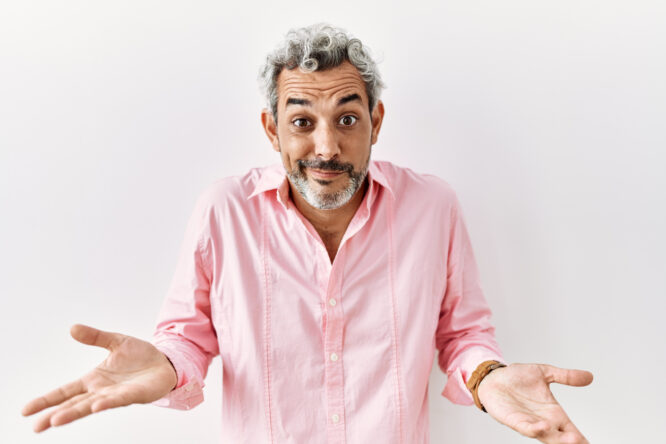Not every compliment lands the way it’s intended.

Some come wrapped in sarcasm, backhanded praise, or subtle digs that leave you feeling weirdly self-conscious instead of seen, even if the people saying them don’t realise how they’re coming across (though they usually do). They might be said with a smile, but the sting they leave still lingers. Here are just some of the “compliments” that feel more like jabs.
1. “You look good today—did you do something different?”

It sounds harmless, but there’s an undertone that makes you pause. If today is a standout, does that mean every other day hasn’t been? The phrasing turns a kind remark into a quiet judgement on your usual appearance. Instead of feeling flattered, you end up second-guessing what’s changed and wondering what they really think on a normal day.
2. “You’re way smarter than I expected.”

On paper, it’s praise. In reality, it reveals more about the other person’s assumptions than about you. They clearly weren’t expecting depth, and now they’re impressed you proved them wrong. You’re left wondering what part of you gave off the “not smart” vibe to begin with. It’s not a compliment; it’s a confession of their low expectations.
3. “You actually pull that off pretty well.”
 Source: Unsplash
Source: Unsplash There’s a subtle emphasis on “actually” that makes it feel like your success was unlikely. As if wearing that outfit or pulling off that idea was a gamble—and somehow, it worked against the odds. It might’ve been meant as approval, but it lands like surprise. And suddenly, what felt confident starts to feel questionable.
4. “You’re so confident—I could never wear that.”
 Source: Unsplash
Source: Unsplash This one’s framed as admiration, but there’s an unspoken edge to it. It often implies that what you’re wearing is bold, risky, or even borderline inappropriate, and the only thing making it “work” is audacity. It puts you in the position of being admired and judged at the same time. And instead of feeling complimented, you end up feeling on display.
5. “You look so different without makeup—I almost didn’t recognise you!”
 Source: Unsplash
Source: Unsplash There’s no winning here. If the goal is to compliment your bare face, it backfires by implying you’re unrecognisable without all the extras. If it’s a dig at how “done up” you usually are, it still feels off. Either way, it plants a seed of self-doubt. You start wondering if your face without effort is that surprising, or if you’ve been unintentionally hiding behind it.
6. “I love how you don’t care what people think.”
 Source: Unsplash
Source: Unsplash This might sound empowering, but it often gets said when you do something unconventional, especially if it makes other people uncomfortable. It suggests that your choices are brave, sure, but also maybe a little weird or hard to relate to. It’s not always about admiration. Sometimes, it’s a passive way of saying, “I’d never do that, but good for you, I guess.”
7. “You’re really photogenic—you look way better in pictures.”

This one hits like a compliment… until the second half sinks in. It implies that the best version of you only exists through a camera lens. In person? Not quite the same energy. You’re left feeling like your real-life presence is somehow lacking, even if no one meant it harshly. It’s not praise—it’s comparison.
8. “You look so young for your age.”
 Source: Unsplash
Source: Unsplash It’s a classic that people mean well, but it subtly reinforces the idea that ageing is a bad thing. It frames youth as the goal and implies that looking older would somehow be less impressive. Instead of feeling proud of where you are in life, you’re reminded that time is something to hide. Obviously, that’s not the energy a real compliment should carry.
9. “You clean up so well.”
 Source: Unsplash
Source: Unsplash Sure, it’s meant to say you look great—but it also implies that your usual vibe is… not this. It turns effort into a surprise and casualness into a flaw. It’s hard to enjoy a compliment when it’s tied to the idea that your normal self isn’t enough. Suddenly, looking nice feels like the exception, not the rule.
10. “You’re surprisingly articulate.”
 Source: Unsplash
Source: Unsplash This one is incredibly shady. It’s praise on the surface, but also reveals some pretty insulting assumptions. What exactly were they expecting? Why is your ability to communicate so shocking? It often comes from people who didn’t think you had it in you—and they think they’re being kind by saying so. Still, it lands like a reminder of what they assumed before you opened your mouth.
11. “You’re so brave to wear that.”

This is one of those compliments that sounds empowering but comes with a definite sting. It usually shows up when someone’s body, size, or style doesn’t fit what other people consider “safe.” Instead of feeling flattered, you’re left wondering why it took bravery to simply wear what made you feel good. It’s a compliment rooted in bias, and once you notice that, it’s hard to un-hear.
12. “You’ve lost weight—you look great!”

It’s often said with enthusiasm, but it reinforces the idea that thinner equals better. It praises the change without knowing what caused it—stress, illness, disordered habits. It also reduces your appearance to a number, as if the rest of you stayed the same. Compliments that only show up when your body changes always come with baggage.
13. “I could never be as chill as you—I’d be freaking out.”

At first glance, it’s a nod to your calm energy. However, it can also sound like a low-key dig, as if you’re too passive or not reacting enough. It walks the line between admiration and confusion. You’re left wondering whether they mean you’re graceful or just oddly detached. Uncertainty like that doesn’t exactly boost your confidence.
14. “You’re not like other girls/guys.”

This one sounds flattering until you realise it’s rooted in comparison. It doesn’t celebrate you—it pits you against everyone else. The compliment comes at the expense of other people, and that’s never a great feeling. It also implies that “others” are something to avoid or look down on, which is its own kind of red flag. You want to be appreciated for who you are, not as an exception to someone else’s stereotype.
15. “You’re so strong—I don’t know how you do it.”

It’s meant to sound empowering, but it often lands like pressure. People say this when they see you hold everything together, but they rarely ask what it’s costing you. Being seen as “strong” can feel lonely. You start to wonder if people only admire your endurance because it means they don’t have to check in deeper. That so-called strength doesn’t always feel good—it just feels necessary.




